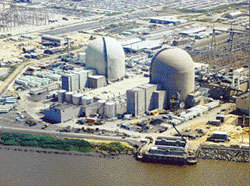
In August 1995, workers at the Salem nuclear plant in New Jersey identified a possible violation of the Unit 2 reactor’s operating license. The operating license required that the efficiency of the charcoal units used in the control room ventilation systems be tested after 750 hours of operation. The charcoal adsorbs radioactive gases, like iodine and krypton, following an accident to delay their eventual release and reduce the radiological consequences for plant workers.
The ventilation system had operated for nearly 988 hours since the last charcoal efficiency test. A member of the licensing group drafted a licensee event report (LER) to inform the NRC of the operating license violation.
The draft LER was reviewed by senior managers at their next meeting. One manager dismissed the event, arguing that the requirement had been satisfied. He pointed out that 988 hours is after 750 hours, precisely as specified by the requirement. During the ensuing debate, someone pointed out that the test was normally performed before the ventilation system accumulated 750 hours of operating time. The manager was asked which condition violated the operating license: conducting the test before 750 hours or long after 750 hours of in-service time. The manager concluded that running the test before 750 hours would also satisfy the requirement, because it was conservative to do so.
Luckily, the “right either way” argument did not prevail. An LER was submitted to the NRC on September 21, 1995. (The NRC maintains a very useful LER search tool on its website that can be used to retrieve this and other nuclear plant LERs dating back to 1980.)
Our Takeaway
While it is frustrating that “no brainers” sometimes take so much effort to get them right, it is encouraging when the process demonstrates protection against getting them wrong. In this case, a superficially logical argument was put forth to deem an apparently non-conforming condition as being acceptable. That perspective was seriously considered by the management team, but ultimately over-ruled.
A strong safety culture does not only enable workers raising correct concerns to be heard. It permits all sincere, legitimate issues to be raised, respectfully discussed, and appropriately resolved. That happened in this case, demonstrating the proper safety culture as well as the proper resolution of this matter.
“Fission Stories” is a weekly feature by Dave Lochbaum. For more information on nuclear power safety, see the nuclear safety section of UCS’s website and our interactive map, the Nuclear Power Information Tracker.
